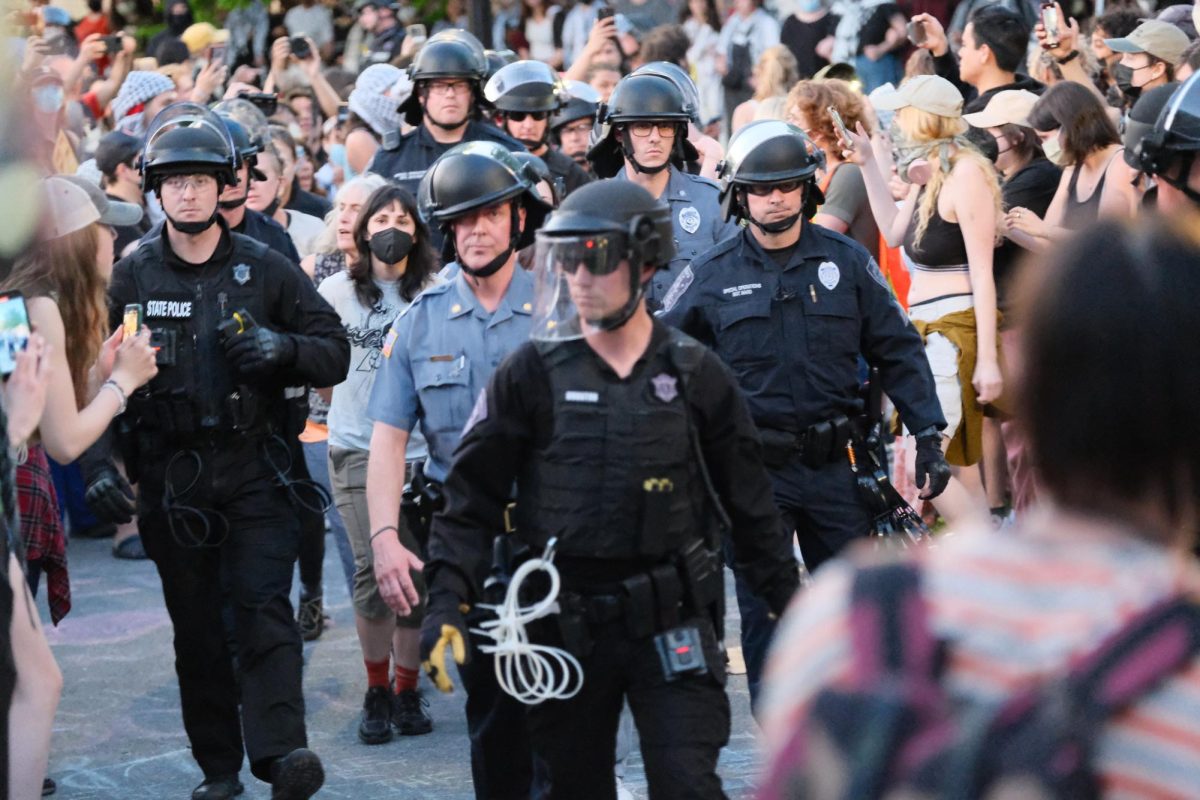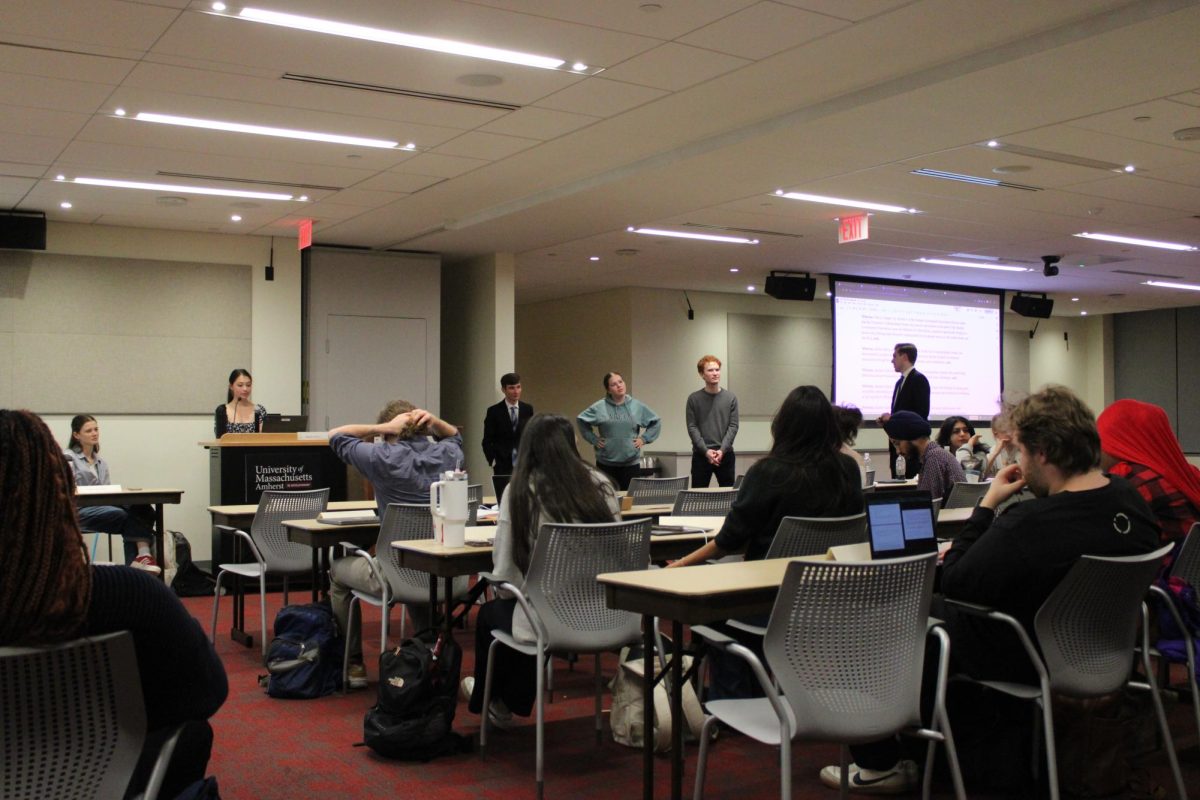
A turnout of around forty people attended the debate between the four candidates for the seat of student trustee in the SGA, held Thursday night in the Campus Center Auditorium.
Taking place after the presidential and vice presidential debates from 8 to 9 p.m., the debate offered insight into the role of student trustee, the key issues that the winning candidate will face tackling, and each individual candidate’s approach to dealing with these challenges.
The four candidates for the seat were Sarah Freudson, Diego Fellows, Lucas Gutterman, and Emily Devenney. Each of the candidates had three minutes to answer each of the five questions.
The board of trustees for the University of Massachusetts is a legislative body, comprised of 19 voting members and 3 non-voting members, dealing with matters concerning all University policy. Of these 22 members are 5 student members – one for each UMass campus.
Many candidates addressed the issue that though they represent close to 30,000 students, the role of student trustee is unclear to many.
The most heavily emphasized point by all of the candidates was the push to expand the number of voting student trustees on the board from two to five, giving every UMass campus a voting voice on the Board. Currently only two student trustees per year are able to vote, on a rotating basis. The candidates expressed a consensus on the ludicrous nature of having merely two student votes out of 19 total votes count, on a board that dictates policy over the students they are elected by and represent.
Gutterman referred to the bill by name – House Bill 1088, which would give all five student members voting rights. He also claimed that the only real opposition to the bill is those who stand to lose power from its passing – insinuating that majority opinion is largely behind its passing.
Fellows participated in the lobby day on November 19, 2013, at the Massachusetts State House, in support of the bill’s passage. He felt that the passage of the bill would better represent the diverse backgrounds of each of the campuses.
Freudson cited the opportunity that voting rights for all student trustees would have for further connecting the UMass campuses. She felt that it would be a chance to better coordinate the wants and goals of the separate campuses.
Devenney stated that having five student representatives on the board, which she described as a body that is intimidatingly adherent to parliamentary procedure, would give a more noticeable student presence without creating a voting bloc. She also expressed that the newfound, direct role students would play in legislative procedure would show the student body that student government has real power, and hoped it would encourage more students to pursue leadership roles.
Building a better relationship between undergraduates and graduates was another ideal echoed by all candidates. The student trustee represents all UMass Amherst students, graduate included, and all candidates felt that awareness of this should be raised among the graduate student community.
Gutterman offered a straightforward approach to making an undergrad-graduate student connection – attending grad student organization meetings. He felt that having a clear presence in these meetings is integral to forging connection.
Devenney spoke of more direct collaboration between SGA and the Graduate Student Senate. She cited her experience with the activism group Student Power Coalition as invaluable in forging connections between groups of people.
Freudson, a legal assistant at the UMass Student Legal Services Office, said that her office’s close proximity to the various graduate student offices has invariably brought her into contact with graduate students on a daily basis. She has already forged many relationships with graduate students as a result of this.
Fellows expressed the need for the SGA to reach out to the graduate student community. He felt that good, open dialogue is the best way to build a working relationship.
The most varied answers came from the first question posed: identify the three biggest issues that the board of trustees must hear. While there were still many common threads within the answers, each candidate had their own take on what was most pressing.
Freudson supported the continuation of UMass’ green energy movement. She also spoke for a continuation of tuition freezes and minimal construction when students are actually on campus.
Fellows also expressed concerns about the affordability of tuition. His other concerns were transparency of the actions of the board of trustees, and the lack of both cultural and economic diversity in the UMass student body.
Gutterman expressed a desire to see repairs to the buildings housing classes for “less glamorous money-making” majors, specifically citing Bartlett as an example. His other two main concerns were diversity on campus, and voting rights for all five trustees.
Devenney wants to see a “shared, equitable government” with increased student input. She also expressed concerns over the treatment of laborers on campus (saying that she wants to be sure they are working in conditions held to OSHA safety standards), and retention rates.
Polls will be open from March 9 until March 11 on Campus Pulse.
Josh Darling can be reached at [email protected].
Editor’s note: A previous version of this article incorrectly spelled one of the candidate’s names.



















Mike • Mar 10, 2014 at 9:08 pm
You haven’t done the uniform a disservice so to speak, but it’s just generally not in good taste to wear a uniform to promote a personal or political agenda. If you’re so inclined, wear a Navy pin on the lapel of a civilian suit, or a tie clip from your uniform, etc. If you are not speaking on behalf of the Navy, or representing the Navy, it’s generally a good idea not to wear the uniform.
This is not to say it’s not OK to use your service as a resume booster, or draw from it for purposes of debate, or mention your pride in being a Sailor, so long as you are not in uniform and acting as or appearing to act as an agent of the Navy.
Thank you for your service
Mike
Jacob • Mar 10, 2014 at 11:22 am
Dear Mike,
I would like to sincerely apologize if I have done you or the uniform a disservice. I was unaware of this policy and would never intentionally bring discredit to the uniform or to the men and women who have worn it before me. I am truly honored that I have the opportunity to serve and represent our country, and would never knowingly disrespect our service men and women or our veterans. Veteran relations on campus are very important to me, and I want UMass to remain a leader in veteran services. I can assure you that I will not let this happen again, and if you have any further concerns I invite you to contact me at [email protected]. Thank you for your concern and time, and hopefully I can resolve this issue.
Very respectfully,
Jacob
Mike • Mar 9, 2014 at 9:03 pm
If this picture is of the debate, way to wear a military uniform to promote a personal/political cause. Besides being plain inappropriate, this is a likely violation of Uniform Regulations as per DOD 1334.01
Mike